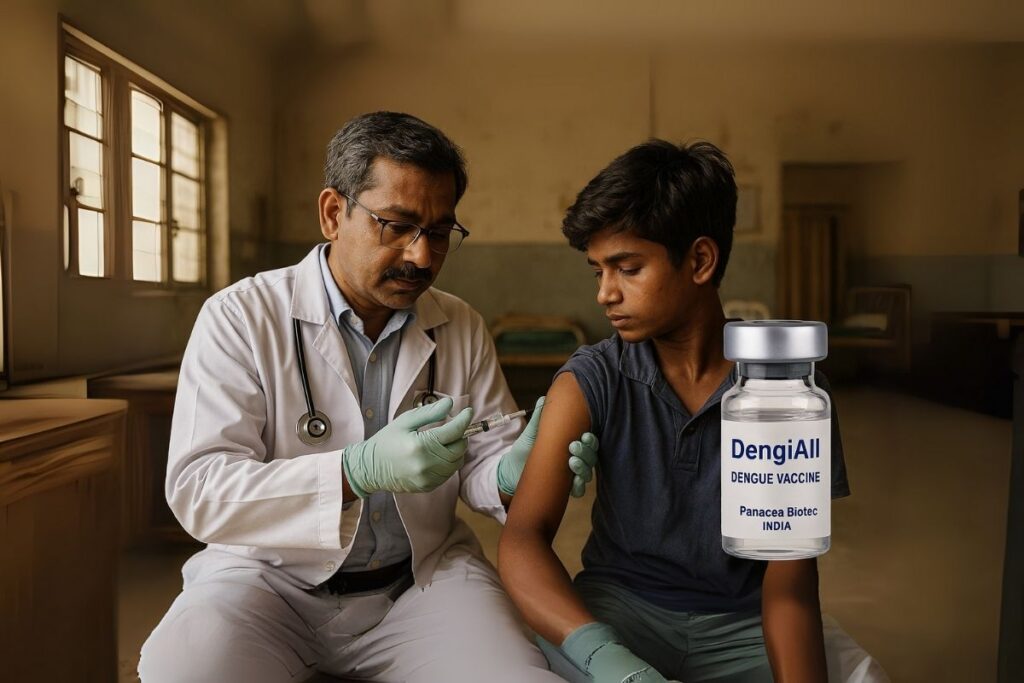Every monsoon season brings a wave of seasonal infections, accompanied by complaints of fever and body ache. Families rush to get platelet counts checked, and doctors worry about internal bleeding. Children are admitted to ICUs. For millions across India, dengue isn’t just a mosquito-borne infection. It’s a recurring yearly threat.
But this time, there is reason for hope. India’s first indigenously developed dengue vaccine called DengiAll has reached its most important milestone yet: a Phase 3 clinical trial, already halfway through with over 7,000 participants enrolled.
If all goes well, it could soon offer the country its most powerful tool yet against a disease that infects lakhs and claims hundreds of lives every year.
Why Does India Need a Dengue Vaccine?
Dengue isn’t rare in India. It is not just a seasonal inconvenience. It affects lakhs of Indians each year and can turn deadly, especially in children, the elderly, and people with weak immunity. In 2024 alone, over 2.3 lakh cases and nearly 300 deaths were officially reported.
Until now, India didn’t have a single approved vaccine for dengue. Treatments are supportive, and there’s no antiviral cure.
Most people infected with dengue show no symptoms but they still spread the virus. However, when symptoms do appear, they can turn deadly quickly, some of which include dangerously low platelets, internal bleeding, shock and even organ failure.
What makes dengue harder to fight is that it isn’t just one virus. There are four type namely; 1, 2, 3, and 4. Getting infected with one doesn’t protect you from the others. In fact, it can sometimes make the next infection worse. That’s why a good vaccine must protect against all four serotypes. The good news is DengiAll is targeted to protect from all four.
So, What Is DengiAll?
DengiAll is India’s first tetravalent dengue vaccine, developed by Panacea Biotec in partnership with the US-based National Institutes of Health (NIH).
● It contains weakened forms of all four dengue viruses.
● It’s designed to produce a balanced immune response against each one.
● It has already shown good results in Phase 1 and 2 trials in India.
This vaccine is not imported, repackaged, or rebranded. It’s made in India, for Indian needs, using our systems and tested on Indian volunteers.
What Makes This Trial So Special?
● The trial is being run by the Indian Council of Medical Research (ICMR) across 20 centres in 18 states and union territories, including cities like Pune, Chennai, Ranchi, Rohtak, Bhubaneswar, and Mysuru.
● Over 10,000 adults (18–60 years old) are being enrolled, with a 2:1 randomization between vaccine and placebo.
● The first dose was administered on August 14, 2024, and enrollment will be complete by October 2025.
● Participants will be followed for two years to track long-term safety and effectiveness.
Crucially, early data from the trial shows no safety concerns. It’s a single-dose vaccine — simple to administer and easier to scale.
Why This Vaccine Could Be a Game-Changer
If successful, this vaccine could transform how India handles dengue:
● Fewer patients will require hospitalization.
● The overall burden on the healthcare system will be reduced.
● More people will be protected and lives can be saved.
● Public confidence in preventive care will be improved.
Children, the elderly, and those in high-risk areas would benefit the most. Plus, it would bring us a step closer to Atmanirbhar Bharat in vaccine innovation, a point that Union Health Minister JP Nadda also emphasized during the launch.
So, When Can We Expect It?
If everything stays on track, India may see regulatory approval for DengiAll within the next year. Full follow-up will continue until late 2027, but emergency use could be considered earlier if interim data is strong.
But until then, the fight isn’t over. We must still:
● Eliminate stagnant water to prevent mosquito breeding.
● Use repellents and protective clothing.
● Get medical help early if dengue symptoms appear.
FAQs
Is this India’s only dengue vaccine in development?
No. Other companies like the Serum Institute are also working on candidates. But DengiAll is currently furthest along, having already completed Phase 2.
Will this be for adults only?
Right now, the trial includes adults. But future trials may expand to children if safety and efficacy are confirmed.
What are the side effects so far?
Reported side effects have been mild—similar to other common vaccines. No serious concerns so far.
How many doses are required?
Just one dose.
Will it be affordable?
Since it’s made in India, the goal is to make it accessible and affordable through public health programs.
HealthPil Stands With India’s Dengue Prevention Efforts
At HealthPil, we believe prevention is as important as cure. That’s why we’re committed to:
● Sharing verified updates on vaccine progress
● Helping patients manage fever and symptoms early
● Connecting you with doctors who can offer expert care and advice
If you or your family are experiencing high fever, fatigue, or unusual bleeding, don’t delay.
Book an online consultation with HealthPil today.
Disclaimer
This blog is for informational purposes only. DengiAll is still undergoing clinical trials and is not yet available for public use. Always consult a qualified healthcare professional for medical advice, diagnosis, or treatment.

